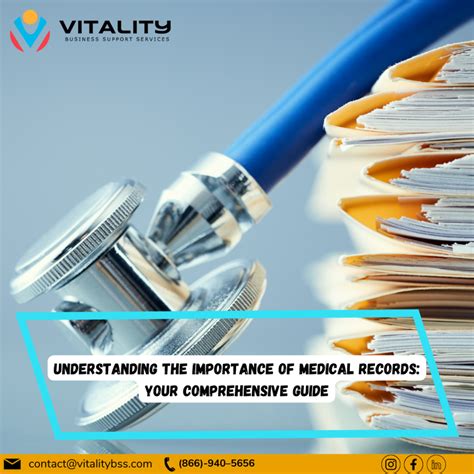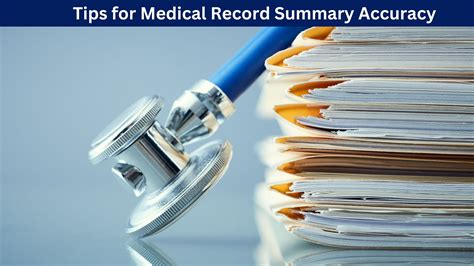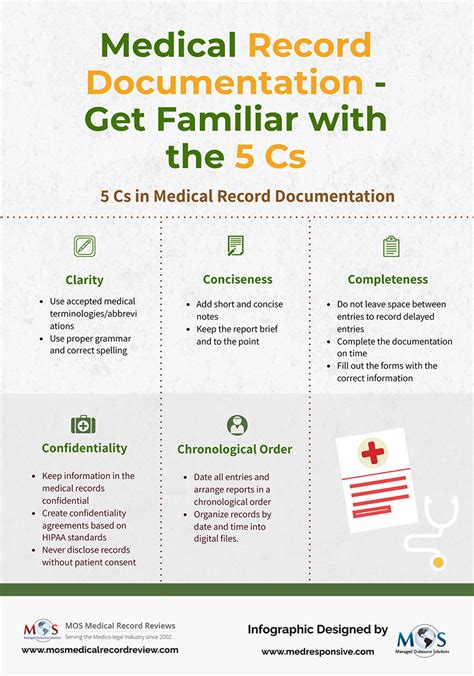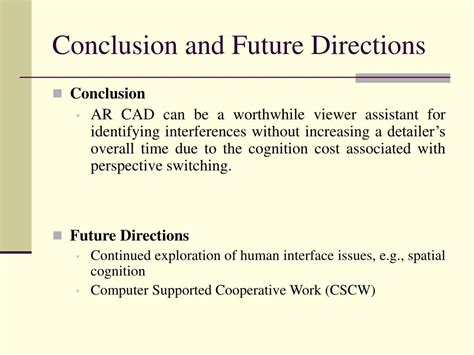Intro
Improve patient care with 5 medical record tips, enhancing data accuracy, security, and compliance, while streamlining clinical documentation and healthcare management systems.
Medical records are a crucial aspect of healthcare, serving as a comprehensive and accurate documentation of a patient's medical history, diagnoses, treatments, and outcomes. The importance of maintaining precise and up-to-date medical records cannot be overstated, as they play a vital role in ensuring continuity of care, facilitating communication among healthcare providers, and supporting medical research and education. In this article, we will delve into the significance of medical records, their various components, and provide valuable tips on how to manage them effectively.
The accuracy and completeness of medical records have a direct impact on patient care and safety. Inaccurate or incomplete records can lead to misdiagnoses, inappropriate treatments, and adverse events, highlighting the need for meticulous attention to detail when creating and maintaining these records. Furthermore, medical records are essential for healthcare providers to track patient progress, make informed decisions, and coordinate care with other healthcare professionals. As the healthcare landscape continues to evolve, the importance of medical records will only continue to grow, underscoring the need for robust management systems and best practices.
The management of medical records is a complex task that requires careful consideration of various factors, including data security, accessibility, and compliance with regulatory requirements. With the increasing adoption of electronic health records (EHRs), healthcare providers must navigate the benefits and challenges of digital record-keeping, ensuring that patient information is protected while also facilitating seamless communication and collaboration. In the following sections, we will explore the key components of medical records, discuss the benefits and drawbacks of different record-keeping systems, and provide practical tips on how to optimize medical record management.
Understanding Medical Records

Components of Medical Records
The components of medical records can be divided into several distinct categories, each playing a vital role in the overall management of patient care. These categories include: * Patient identification and demographics * Medical history, including diagnoses, treatments, and outcomes * Laboratory and radiology results * Medication lists and treatment plans * Progress notes and discharge summaries * Consent forms and advance directives By recognizing the various components of medical records, healthcare providers can ensure that patient information is complete, accurate, and up-to-date, supporting high-quality care and optimal patient outcomes.Benefits of Accurate Medical Records

Challenges in Medical Record Management
Despite the importance of medical records, their management poses several challenges, including data security, accessibility, and compliance with regulatory requirements. The increasing adoption of EHRs has introduced new challenges, such as: * Ensuring data integrity and accuracy * Protecting patient information from unauthorized access * Facilitating seamless communication and collaboration among healthcare providers * Complying with regulatory requirements, such as HIPAA By acknowledging these challenges, healthcare providers can develop strategies to overcome them, ensuring that medical records are accurate, secure, and accessible.5 Medical Record Tips

Best Practices for Medical Record Management
In addition to these tips, healthcare providers can adopt best practices to optimize medical record management, including: * Developing clear policies and procedures for record-keeping * Providing training and education on medical record management * Conducting regular audits to ensure accuracy and completeness * Implementing quality improvement initiatives to enhance patient care and safety By adopting these best practices, healthcare providers can ensure that medical records are accurate, secure, and accessible, supporting high-quality care and optimal patient outcomes.Conclusion and Future Directions

Final Thoughts
The importance of medical records cannot be overstated, highlighting the need for robust management systems and best practices that prioritize precision, completeness, and accessibility. By working together to optimize medical record management, healthcare providers can enhance patient care and safety, support medical research and education, and improve the overall quality and efficiency of care.What is the importance of medical records in healthcare?
+Medical records are crucial in healthcare as they provide a comprehensive and accurate documentation of patient information, supporting continuity of care, facilitating communication among healthcare providers, and enhancing patient safety.
What are the components of medical records?
+Medical records comprise various components, including patient demographics, medical histories, laboratory results, radiology reports, and treatment plans, which serve as a centralized repository of patient data.
How can healthcare providers optimize medical record management?
+Healthcare providers can optimize medical record management by ensuring accuracy and completeness, using standardized templates, implementing robust security measures, facilitating communication and collaboration, and regularly reviewing and updating records.
We hope this article has provided valuable insights into the importance of medical records and offered practical tips on how to optimize their management. If you have any questions or comments, please do not hesitate to share them with us. Your feedback is essential in helping us improve our content and provide the best possible information to our readers. Thank you for taking the time to read this article, and we look forward to your comments and suggestions.
